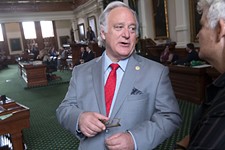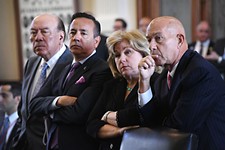Lege Notes
Odds and ends (mostly odds) from the 79th
Fri., May 20, 2005
• After a two-month delay, Sen. Troy Fraser, R-Horseshoe Bay, finally laid out his version of telecommunications deregulation in the Senate Business & Commerce Committee this week. Fraser presented a gentler view of dereg, a far more limited approach than that of House sponsor Rep. Phil King, which gives strong advantages to larger, established telephone carriers such as SBC – requiring the telephone giant to cut access fees to other carriers but also waiving the carrot of statewide, rather than local, franchises on television services and the complete deregulation of local phone rates by September. Unlike King's version, Fraser's "telecom dereg lite" still provides some caution on deregulation, giving the Public Utility Commission a role in determining whether deregulation is the right move for suburban and rural markets. Fraser avoids the touchy issue of right-of-way fees, delays the dropping of access charges and avoids the municipal Wi-Fi issue that has drawn the ire of groups such as Save Muni Wireless. Meanwhile, King has amended his version of telecom deregulation to the PUC sunset bill in the Senate. Stay tuned. – Kimberly Reeves
• Austin city officials are huddled with Sen. Todd Staples, R-Palestine, to try to soften the blow under the major "takings" bill of the session, HB 2833, but to date, they have yet to sway the lawmaker to make changes in their favor. Supporters characterize HB 2833 as "just compensation" for property owners who suffer a loss of value of their properties due to city and county regulations. But the Conference of Urban Counties has dubbed HB 2833 the "colonias bill" because it characterizes almost any type of regulation as a "taking," as long as it devalues property by more than 25%. At a hearing before the Senate Natural Resources Committee, Jim Marston of the Environmental Defense Fund argued that HB 2833 cast too wide a net. He quoted a former Senator who said a bill with more than five exceptions was a bill that needed to be written more narrowly. So far, HB 2833 has more than a dozen exceptions for different types of regulation cities should be able to offer without penalty, with more exceptions being entertained by Staples to accommodate the concerns of even more cities. In the meantime, Sens. Gonzalo Barrientos, D-Austin, and Frank Madla, D-San Antonio, managed to neutralize the potential damage of SB 1858 to Central Texas, clarifying that cities could exceed the water-quality bar the Texas Commission on Environmental Quality would set for various regions in the state. Barrientos' amendment ensured that cities could set water-quality standards before TCEQ approval, in order to prevent a rush to file incomplete plans attempting to take advantage of the bill. – K.R.
• The University of Texas was at odds with many Austin lawmakers as the House passed its amendments to the Top 10 Percent law, which guarantees admission to any state university for students who finish in the top 10% of their class. UT had protested that this had become the sole indicator in admitting students to the university, preventing UT from considering more diverse factors when admitting the freshman class. Under the amendments that passed in the House, no more than 50% of the freshman class could be admitted under the Top 10 Percent rule, with a laundry list of other factors also considered once the cap is reached. Both minority and rural lawmakers protest the change, however, saying that Top 10 Percent is working by providing a broader class of successful students to Texas universities. Speaker Pro Tem Rep. Sylvester Turner, D-Houston, begged for an amendment to designate "diversity" as a key indicator for admission, but didn't get it. Rep. Dawnna Dukes, D-Austin, who is of distant relation to Heman Sweatt, argued that the real problem was not the Top 10 Percent but the lack of seats available to students at flagship universities in the state. That point was reinforced later in the day when the House passed a bill suggesting $1.3 billion in tuition revenue bonds for new university facilities across the state, facilities that may or may not have funding available under the current budget. – Kimberly Reeves
• Two years after deep cuts in the state budget hobbled children's health services, a joint budget-writing committee agreed this week to restore dental, vision, and mental health benefits to the program. But the return of these benefits still falls short of what health care advocate Rep. Garnet Coleman had hoped for – the restoration of coverage to thousands of kids who were cut from the Children's Health Insurance Program in 2003. The committee's budget recommendations would provide CHIP coverage to about 350,000 children in 2007, 35,000 below the needs projections of the Health and Human Services Commission. "This proposal fails to address the health insurance crisis in Texas," Coleman said. On a cheerier note, Coleman expressed gratitude for the committee's restoration of cuts to adult Medicaid. In a separate decision, committee budget writers adopted a $175 million increase for the distressed Child Protective Services division. Gov. Rick Perry, who flagged CPS as a high-priority item for this session, had sought $250 million; it's likely that the $175 million figure will grow by the time legislators approve the final budget. – Amy Smith
Got something to say on the subject? Send a letter to the editor.










